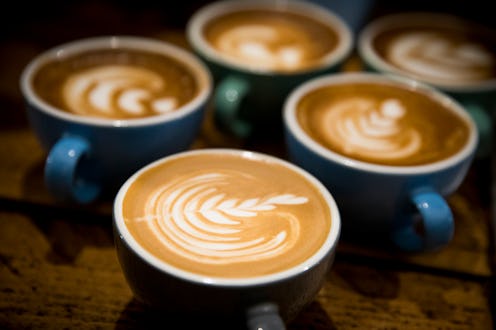Life
Could Coffee Make You Live Longer?

“But first, coffee…” has never meant more than it does today, as a new study found that coffee doesn’t just make mornings easier — it could make you live longer, too. The news isn’t surprising when you consider how life-changing a cup of joe can be in the morning. The conclusion comes by way of two studies that were recently published in the journal Annals of Internal Medicine, which found regular coffee consumption to be somewhat indicative of a longer life — or in the very least, connected.
The two studies followed samples of coffee drinkers over a significant number of years to chart the effects of their coffee habit on their overall health, as well as their likelihood to contract certain ailments like heart disease, cancer, and diabetes. Between the two studies, more than 700,000 coffee drinkers were studied, with particular attention paid to the participants’ ethnicities and background. This nuance is significant when you consider that most coffee studies have primarily focused on Europeans and individuals of European descent. Thanks to this diversity control, we can safely rule out the possibility of the positive effects only being applicable to one single race or ethnicity.
Although the studies were observational, and thus can’t offer definitive causation, both studies produced fascinating findings. In both studies, scientists tried to control for any outstanding health factors that could skew results to ensure that data would be as accurate as possible, and included different types of coffee, as well. Many might chalk the health benefits up to coffee’s caffeine, given its ability to dramatically improve other parts of our lives (hello, early mornings and late-night deadlines). But it’s important to note that individuals who consumed decaf coffee also so improved longevity, meaning the caffeine might not be to blame after all.
The first study, which focused on data from a study that followed the coffee habits of over 500,000 Europeans 16 years, demonstrated a hard connection between coffee consumption and a lower risk of death. The second study followed over 185,000 Americans for more than 16 years, and found that (like the first study) the likelihood of death by way of heart disease, cancer, respiratory disease, diabetes, kidney failure, or stroke was significantly lower in coffee drinkers than that of individuals who did not drink coffee at all. Additionally, compared to non-coffee drinkers, participants who consumed around two or three cups daily were 18 percent less likely to die early, while single-cup drinkers were still 12 percent less likely to die earlier in life.
The studies delved deeper into the data and found insights based on gender, as well. The findings showed that the top 25 percent of coffee-drinkers in the sample had around three or more cups of coffee a day, and that within that subset, male coffee drinkers were 12 percent less likely to die early than male non-coffee snobs, and that female coffee-drinkers had a 7 percent longevity leg up on women who did not drink coffee. It’s hard to pinpoint the cause of the disparity between the male and female data — especially when you consider that, in general, women tend to live longer than men. Further, the studies confirmed what previous research has already shown of coffee consumption: that regularly partaking in java could be responsible for improved liver function, blood sugar levels, and even inflammation.
Many individuals try to curb their coffee intake, or kick the habit altogether, but specialists still maintain that avid coffee drinkers aren’t at risk of any kind of health problems due to regular consumption — and that anything below five cups a day is A-okay.
In short, the studies concluded that the more coffee a member of the sample drank, the less likely they were to die earlier on in life. Aka, ignore the coffee haters, and don’t go slashing your Starbucks budget anytime soon.